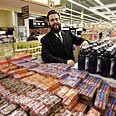
Kosher craze sweeping U.S.
Major food manufacturers, grocery chains compete for 9 billion dollar kosher market; analysts say market for kosher products growing at 15 percent per year
Albertsons, one of America's largest grocery chains, has since dramatically expanded kosher aisles at hundreds of its supermarkets across the country.
The company has also launched more than two dozen kosher destination stores that include everything from bakeries to delis.
"There's a kosher awakening," said Yarmove, an observant Jew who is Albertson's corporate kosher, marketing and operations manager.
"Kosher was perceived as scary and foreign. Now it's perceived as chic. I think everybody is realizing that there is an opportunity," he added.
Bringing matzah to church
The Idaho-based Albertsons is just one of many companies around the country competing to get a lucrative slice of an approximately USD9 billion kosher industry that is growing at a rate of 15 percent a year.
Experts say the boom is being fueled by several factors, including vegetarians and younger customers looking for healthier and safer food – the same demographic that has helped the organic market take off. Plenty of these customers are not Jewish.
"When I take the matzahs to the church, they love it," said Ursula Torres, of Manhattan, who was buying 100 percent wheat matzos recently at Streit's, a Jewish landmark on New York's Lower East Side.
Kosher as 'Good Housekeeping'
Marcia Mogelonsky, a senior research analyst with Mintel International Group, a Chicago-based consulting firm, recently completed a nationwide study in April that produced some surprising results about the kosher craze.
She found 55 percent of the people who buy kosher products believed the food was better for them – almost double the number in a similar study Mogelonsky conducted in 2003.
"They trust the kosher symbol like they'd trust the Good Housekeeping seal," she said.
Part of the trust, Mogelonsky said, is derived from how the animals are raised. There is a popularly-held myth that Jewish law forbids the use of antibiotics, additives, hormones or feeding animal byproducts to animals raised for kosher slaughter. But Jewish law has no such regulations.
Jewish for 'good food'
Manischewitz, one of the best-known kosher food companies in the world, is developing an advertising campaign that says their name is "Jewish for good food."
Hebrew National, a division of ConAgra Foods, has always touted that famous tagline found on its packages: "We answer to a higher authority." But over the summer, the company decided to move the "Finest Kosher Quality" seal to a more prominent spot on certain product packaging.
Lou Nieto, president of packaged meats at ConAgra, said two things are driving the double-digit growth at Hebrew National, which recently opened a new state-of-the-art kosher facility in Michigan.
"First and foremost is taste but number two is that it's 100 percent kosher beef – nothing artificial," said Nieto, who oversees the Hebrew National brand.
He added that sales were being bolstered by non-Jewish customers, who devour the company's popular hot dogs at hundreds of venues across the United States.
International kosher
To meet demand, the industry has undergone radical changes, recognizing that kosher food is more than matzo, gefilte fish and borscht.
The transformation was on display last month in New York at Kosherfest 2005, a convention that drew more than 6,100 retail and foodservice buyers, manufacturers and distributors from 36 countries.
"Anything that can be made kosher, is being made kosher," said Menachem Lubinsky, who founded Kosherfest. "Even the Chinese are going kosher."
Kosher dumpling wrappers – no problem. Asian sesame ginger noodle and Thai chili sauce? They got it. Italian kosher. It's in abundance. Penne rigate, lasagna, angel hair, and all enriched with soy protein. There is also a kosher energy drink called "Kabbalah."
And it seemed like almost everyone was selling humous, creating a war of the chick pea. If any one food is leading the kosher charge, it might be humous.
One of the biggest humous makers is Sabra Go Mediterranean, produced by Blue & White Food Products in New York.
"Today, all the hippies buy this stuff," said Nissim Ohana, who distributes Sabra products and has been selling kosher food for 20 years in the United States. "Humous has become a very hot item."
Business is business
At Streit's, the venerable New York company is adapting to the changing environment, producing Mediterranean, Spelt and five-grain matzos, along with spreads like sundried tomato morsels.
"Chains carry it," said Alan Adler, director of operations at Streit's, which has been making matzos since 1925. "Our products are on the shelf year round. We are having trouble baking enough matzos."
In two decades, Ohana, an Israeli, has seen the number of Brooklyn stores purchasing his kosher food rise from 16 to more than 200.
"Five years ago, it wouldn't have sold," said Frank Widdi of Met Foodmarkets in Brooklyn. Widdi, a Palestinian, now has two separate refrigerators with humous, including one for Sabra which he gets from Ohana.
A Palestinian selling kosher humous?
"Business is business," Ohana says.










